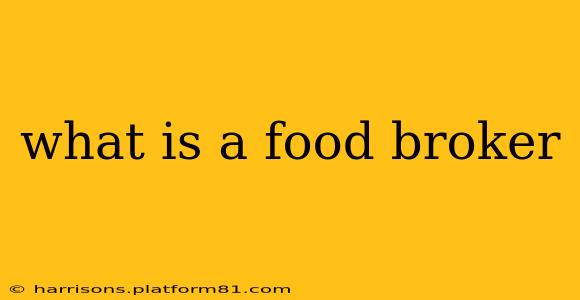The food industry is a complex network of producers, manufacturers, distributors, and retailers. At the heart of this network, often acting as the crucial link between food producers and buyers, are food brokers. But what exactly is a food broker? Simply put, a food broker acts as a sales representative for food manufacturers, connecting them with buyers such as grocery stores, restaurants, and food service companies. They don't own the products they sell; instead, they earn a commission on each successful sale. Think of them as matchmakers in the world of food, bringing together the right products with the right buyers.
What Does a Food Broker Do? A Day in the Life
The role of a food broker is multifaceted and dynamic. Their daily tasks might include:
- Identifying Potential Buyers: Food brokers actively search for potential buyers who might be interested in their clients' products. This involves market research, networking, and building relationships with key decision-makers in the food industry.
- Negotiating Sales: Once a potential buyer is identified, the broker negotiates the terms of the sale, including pricing, delivery, and payment terms. They work to ensure a mutually beneficial agreement for both the manufacturer and the buyer.
- Managing Relationships: Building and maintaining strong relationships with both manufacturers and buyers is crucial. Food brokers act as a liaison, keeping both parties informed and addressing any issues that may arise.
- Market Research and Analysis: To effectively match products with buyers, food brokers must stay up-to-date on market trends, consumer preferences, and competitor activity.
- Providing Sales Support: Beyond simply connecting buyers and sellers, brokers often provide additional sales support, including marketing materials, samples, and technical assistance.
How Do Food Brokers Get Paid? Understanding Commissions
Food brokers are typically compensated through a commission structure. This commission is a percentage of the sales value and is usually paid by the food manufacturer. The commission rate varies depending on several factors, including the product, the volume of sales, and the complexity of the deal. It's important to note that the broker doesn't set the price of the product; that's determined by the manufacturer.
What are the Benefits of Using a Food Broker?
For food manufacturers, using a food broker offers several significant advantages:
- Expanded Market Reach: Brokers have extensive networks and relationships within the food industry, allowing manufacturers to reach a wider range of potential buyers than they could on their own.
- Reduced Sales Costs: Using a broker eliminates the need for a manufacturer to build and maintain a large sales team. The broker's commission is often less than the cost of employing a dedicated sales force.
- Specialized Expertise: Brokers possess in-depth knowledge of the food industry, including market trends, buyer preferences, and regulatory requirements.
- Increased Sales Efficiency: Brokers are experienced negotiators and are adept at closing deals, resulting in increased sales efficiency.
What is the Difference Between a Food Broker and a Food Distributor?
This is a common point of confusion. While both work within the food industry, their roles are distinct:
- Food Brokers: Act as sales representatives, connecting manufacturers with buyers. They do not own or handle the products.
- Food Distributors: Purchase products from manufacturers and then sell and distribute them to buyers. They own the inventory and manage the logistics of delivery.
What are the Qualities of a Successful Food Broker?
A successful food broker possesses a combination of skills and qualities:
- Strong Networking Skills: The ability to build and maintain strong relationships is crucial.
- Negotiation Skills: Effectively negotiating deals to benefit both parties is essential.
- Market Knowledge: A deep understanding of the food industry and market trends is necessary.
- Sales Acumen: The ability to identify potential buyers and close deals is key.
- Excellent Communication Skills: Clear and effective communication is vital for managing relationships and resolving any issues.
How to Find a Food Broker?
Finding a reputable food broker often involves networking within the industry, attending trade shows, or searching online directories. Consider factors such as their experience, their network of contacts, and their commission structure.
In conclusion, food brokers play a vital and often overlooked role in the food industry. They are the skilled intermediaries connecting producers with buyers, facilitating the smooth flow of food products from farm to table. Understanding their function is crucial for anyone involved in or interested in the food industry.
